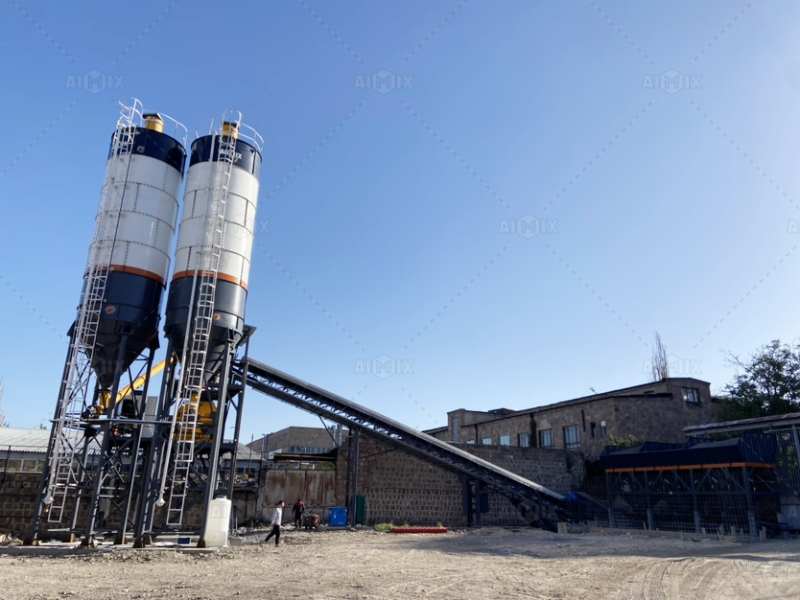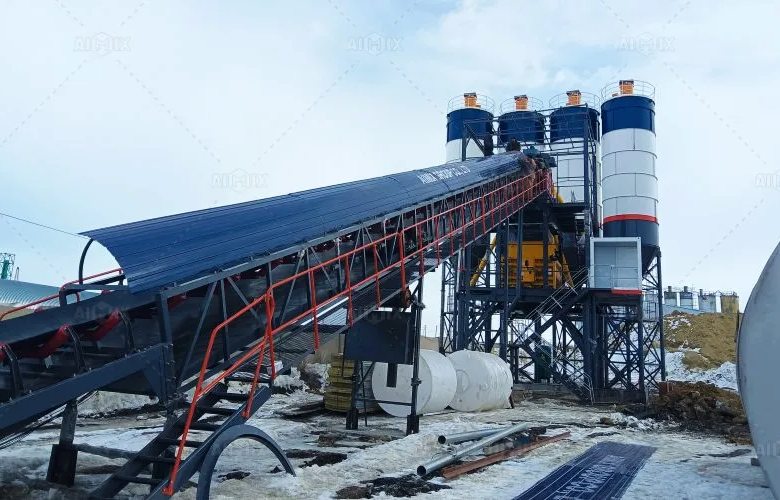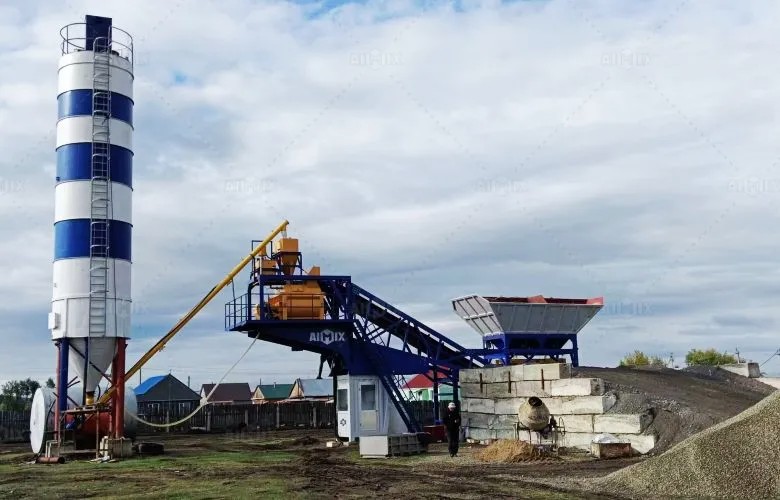Concrete production is one of the most crucial activities in the construction industry, providing the foundation for a wide range of structures, from buildings to roads and bridges. Over the years, advancements in automation have significantly modernized concrete production processes, improving efficiency, precision, and overall quality. Automated systems in concrete batching plants have revolutionized the way concrete is mixed, measured, and distributed. In this article, we explore the role of automation in modernizing concrete production, with a focus on different types of batching plants, including stationary concrete batching plants, mobile concrete batch plants, and the role of concrete batching plants manufacturers in driving innovation.

Automation in Concrete Batching Plants
Automation refers to the use of control systems, such as computers, robots, and information technologies, to manage and monitor the production process with minimal human intervention. In concrete batching plants, automation is used to streamline the measurement, mixing, and distribution of concrete ingredients—cement, aggregates, water, and additives—to ensure consistency and quality in the final product.
Automated batching plants offer a variety of benefits:
Increased Precision: Automation ensures that the right quantities of ingredients are mixed in precise proportions every time, reducing the chances of human error.
Improved Efficiency: Automated systems can operate continuously without the need for breaks, significantly increasing the throughput of the plant.
Reduced Labor Costs: With less reliance on manual labor, operators can reduce costs associated with hiring and training workers.
Enhanced Monitoring and Control: Automation allows for real-time monitoring of production, enabling operators to quickly detect and address any issues that arise, thus minimizing downtime.
Consistency and Quality: By controlling the mixing process with precision, automated batching plants ensure the consistent quality of concrete, which is essential for the structural integrity of construction projects.
Stationary Concrete Batching Plants and Automation
Stationary concrete batching plants are fixed installations that are designed to handle large-scale concrete production needs for long-term projects, such as highways, bridges, and large buildings. These plants are typically used in projects that require a high volume of concrete and offer the ability to handle multiple types of concrete mixes simultaneously.
The role of automation in stationary concrete batching plant is particularly significant due to the scale and complexity of operations. Automation systems in stationary plants are typically more advanced, incorporating sophisticated software for batching control, recipe management, and data logging. These systems can monitor various parameters, such as mix ratios, aggregate moisture content, and mixing times, to ensure the production of high-quality concrete.
Some key features of automation in stationary concrete batching plants include:
Centralized Control: Operators can control all aspects of the batching process from a centralized control room, monitoring every stage of production from ingredient mixing to batching and delivery.
Batching Software: Automated batching software allows for the storage of multiple concrete recipes, making it easier to switch between different mix designs without having to manually adjust equipment.
Real-Time Monitoring: Sensors and digital systems provide real-time data on material consumption, equipment performance, and environmental conditions, enabling proactive adjustments to optimize efficiency.
Automatic Material Handling: The use of conveyors, hoppers, and silos connected to automated systems ensures smooth material handling, reducing the risk of material wastage and ensuring accurate mixing.
By adopting automation, stationary batching plants can meet the increasing demand for consistent, high-quality concrete while minimizing downtime and improving cost-effectiveness. This makes them ideal for large-scale, long-term projects where time and consistency are critical.

Mobile Concrete Batching Plants and Automation
Mobile concrete batching plants, on the other hand, are portable, flexible solutions designed for projects that require mobility, such as road construction or remote infrastructure development. These plants can be quickly set up on-site and relocated as necessary, making them ideal for smaller projects or those in locations where stationary plants would be impractical.
While mobile batching plants are generally more compact than stationary ones, automation still plays a crucial role in ensuring efficient and consistent concrete production. These plants often come equipped with automated controls that manage the batching process, allowing operators to monitor and adjust production parameters remotely or through a control panel.
Key features of automation in mobile concrete batch plant include:
Compact Automation Systems: Mobile plants come with built-in automated systems that allow for easy management of the batching process, including ingredient selection, measurement, and mixing.
Flexible Operations: Operators can adjust mix designs and production schedules quickly, even while the plant is in operation, allowing them to meet the changing needs of a construction site.
Remote Monitoring: Many mobile plants are equipped with telematics and remote monitoring systems that allow operators to track production from a central location or even via a smartphone.
Quick Setup and Shutdown: Automation simplifies the setup and shutdown process for mobile plants, allowing operators to configure the plant quickly when moving from one project to another.
The automation in mobile batching plants ensures that even in temporary, mobile operations, high-quality concrete can be produced with the same level of precision and reliability as stationary plants.

The Role of Concrete Batching Plants Manufacturers
Concrete batching plant manufacturers are key players in driving the modernization of concrete production. They design and build the plants, integrating advanced technologies and automation systems into their designs. Manufacturers invest in research and development to improve automation and enhance the capabilities of their batching plants.
Some of the major contributions that concrete batching plants manufacturers make to the role of automation include:
Innovative Plant Designs: Manufacturers design plants with automation in mind, offering solutions that cater to both stationary and mobile operations. They create systems that integrate seamlessly with batching software, sensors, and control systems.
Customized Automation Solutions: Recognizing that every construction project has unique requirements, batching plant manufacturers provide customized automation solutions that meet the specific needs of their clients, including the ability to handle a variety of concrete mixes and produce at high volumes.
User-Friendly Interfaces: Manufacturers design intuitive control interfaces that make it easy for operators to manage automated systems. These interfaces include visual displays, touchscreens, and automated alerts to help operators monitor performance and troubleshoot issues.
Ongoing Support and Maintenance: Manufacturers offer ongoing support and maintenance services for batching plants, ensuring that automation systems are functioning correctly and that operators receive training on how to use the technology effectively.
By focusing on technological advancements and automation, batching plant manufacturers enable plant operators to benefit from greater control, efficiency, and consistency in concrete production.
Conclusion
Automation is playing a transformative role in modernizing concrete production, and its impact is evident in both stationary and mobile batching plants. For stationary plants, automation enhances large-scale production by ensuring precision, consistency, and efficiency. For mobile batching plants, automation offers flexibility, quick setup, and reliable on-site concrete production. Furthermore, concrete batching plant manufacturers are crucial in driving these advancements by integrating automation systems into their designs, ensuring that operators can produce high-quality concrete with minimal effort.
As the construction industry continues to evolve, the demand for efficient, reliable, and sustainable concrete production will only increase. Automation in batching plants will continue to be a driving force in meeting these demands, enabling plant operators to stay competitive in a rapidly changing market. By embracing automation, batching plants can optimize their operations, reduce costs, and enhance the overall quality of concrete production.
